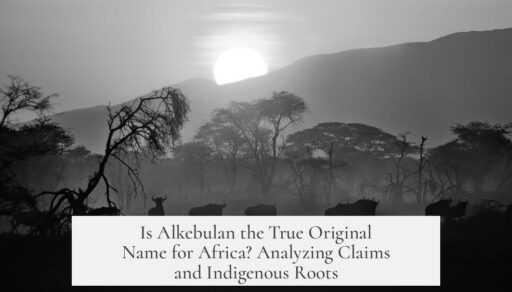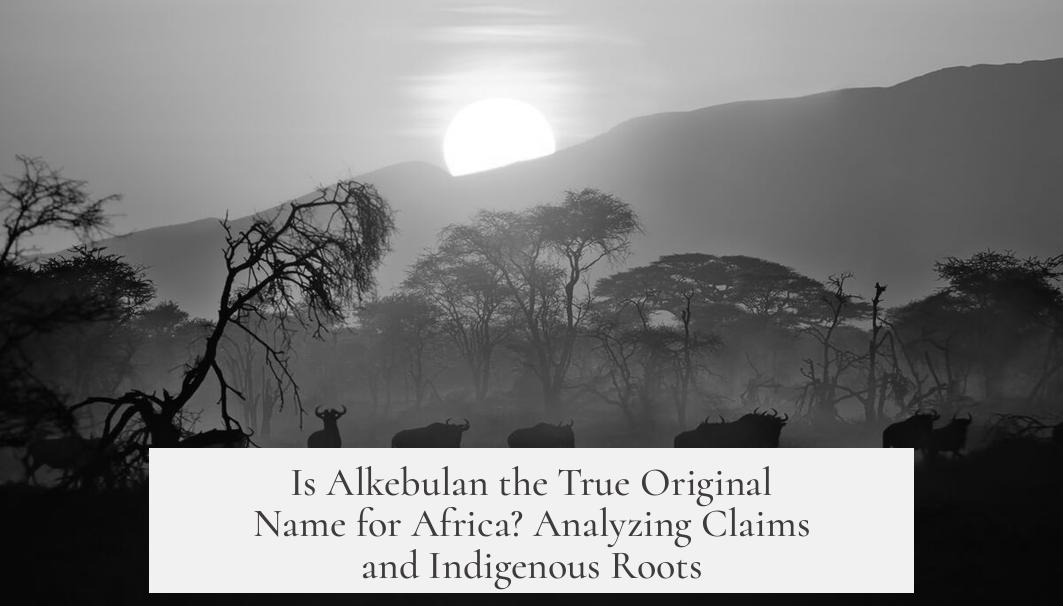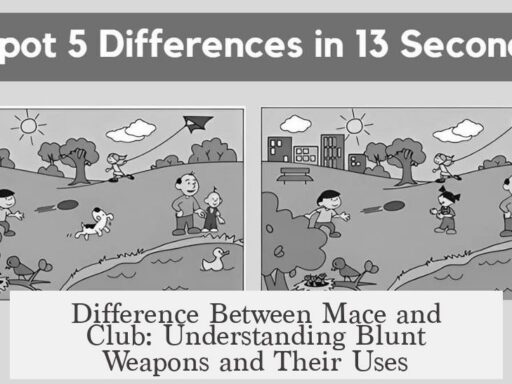The claim that “Alkebulan” was the earliest or original indigenous name for Africa and stands as the sole native name lacks credible evidence and scholarly support. This term does not appear in reliable historical records, linguistic sources, or early African languages, and its asserted Arabic origin is unsubstantiated.
Many discussions around “Alkebulan” describe it as meaning “The Land of the Blacks” in Arabic. However, examinations of Arabic linguistics show that the word “Alkebulan” or “al-Kebulan” cannot be easily traced within Arabic lexicons. The “al-” prefix serves as a definite article in Arabic, but “Kebulan” itself has no recognized meaning or root in classical or modern Arabic. Arabic as a language entered Northern Africa much later, following the spread of Islam in the 7th century CE. Any association of Arabic with the indigenous naming of the African continent is chronologically implausible since indigenous African societies and languages predate Arabic influence by millennia.
The concept of a unified indigenous name for Africa itself is problematic. Africa houses over 2,000 languages from six major language families and a profound cultural diversity across a vast geographic expanse. Historically, there was no single political or geographical entity called “Africa” known to its diverse peoples. Instead, names referred to local tribes, kingdoms, or regions rather than the entire landmass now called a continent. For instance, names like Kabylia (Tamurt n Leqbayel), a region in northern Algeria, are regionally specific and do not denote the whole continent.
The currently accepted name “Africa” has a complex etymology firmly rooted in antiquity. It originates from Latin and Roman usage. “Afri” was a Latin term referring to the inhabitants of the region around Carthage (modern-day Tunisia). This name possibly stems from native Libyan tribes or connections to Phoenician and Berber words such as “afar” (dust) or “ifri” (cave dwellers). The suffix “-ica” denotes “land of.” This provincial name “Africa” then evolved through time and was adopted in various forms including the Arabic “Ifriqiya” during Islamic rule.
Historical scholarship points to multiple hypotheses concerning the origin of the name Africa, including:
- Connection to Berber roots referencing cave dwellers (“Ifri”).
- Derivation from Phoenician “afar,” meaning dust.
- Possible link to Latin “aprica,” meaning sunny.
- Greek “aphrike,” signifying without cold.
- Egyptian roots, meaning birthplace or origin.
These theories share a documented base in linguistic, archaeological, and historical contexts. By contrast, the “Alkebulan” narrative lacks such verification and is often tied to modern pan-African nationalist ideologies or pseudo-historical claims. These narratives tend to oversimplify Africa’s vast and heterogeneous history, sometimes aiming to counteract European colonial narratives but often distorting scholarly facts in the process.
Additionally, misconceptions about the name Africa’s origin exist, such as the incorrect attribution to “Louis Africanus,” a non-existent European invader figure. The respected Roman general Scipio Africanus acquired the cognomen “Africanus” as a victory title related to his conquest of Carthage, rather than inventing the continent’s name. The Roman province name predates these figures and reflects a Roman geographic designation, not a colonial invention.
Regional names with indigenous roots abound but refer to specific ethnic groups or territories rather than the continent. The Berber tribes such as Banu Ifran, or the Kabyle people, reflect rich cultural identities connected to localized names, yet these are distinct from a single ancient name for the entire continent.
The scholarly consensus emphasizes:
- No reliably attested evidence supports Alkebulan as an earliest or indigenous name for all Africa.
- The name Africa itself has a long, multi-sourced etymology primarily linked to the Roman province and local tribes in North Africa.
- The notion of a singular indigenous name for such a linguistically and culturally diverse continent is anachronistic.
- Alkebulan as a term appears mainly in modern cultural or political contexts, lacking historical linguistic validation.
Overall, the idea that Alkebulan was Africa’s original indigenous name is not backed by historical or linguistic research. Instead, the continent’s naming results from layers of history, involving Roman, Phoenician, Berber, and Arabic influences over time. Africa’s deep complexity and diversity resist reduction to one single name.
| Aspect | Insight |
|---|---|
| Alkebulan Origin | No credible Arabic or indigenous origin found; term not in recognized lexicons |
| Arabic Influence | Arrived post-Islam (7th century CE), too late for continent naming |
| “Africa” Name Origin | Derived from Roman Latin “Afri” tribe and “Africa” province |
| Continental Naming Concept | Indigenous groups named tribes/regions, not whole continent |
| Pseudo-Historical Claims | Tied to neo-pan-African rhetoric, lack historical evidence |
Key takeaways:
- “Alkebulan” is not a historically verified indigenous name for Africa.
- The name Africa has ancient origins tied to Roman provincial designations and local tribes.
- African linguistic and cultural diversity defies the idea of a single ancient continental name.
- Claims about Alkebulan often arise in modern political or cultural movements, not from scholarship.
- Understanding Africa’s naming requires nuanced examination of multiple historical and linguistic sources.
Is Alkebulan the Original Indigenous Name for Africa? A Closer Look at the Truth Behind the Claim
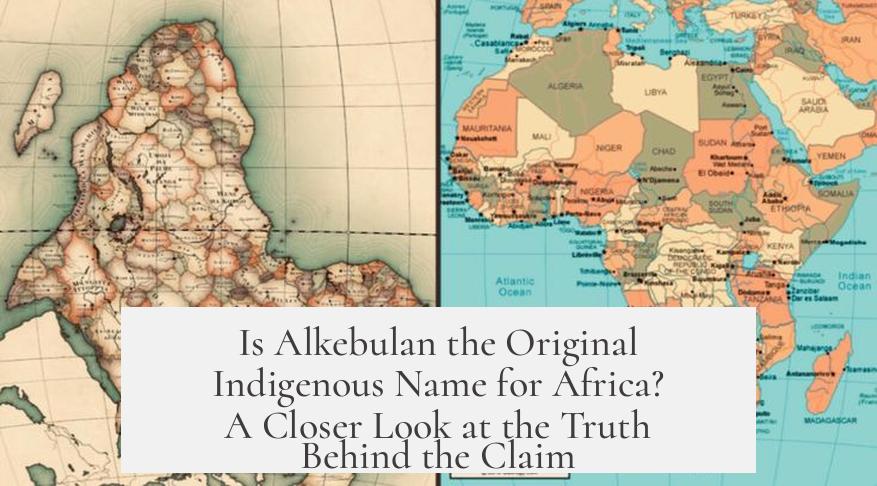
Let’s cut to the chase: there is no credible evidence that the earliest name for Africa was “Alkebulan,” nor that it is the sole indigenous name for the continent. This assertion, popular in some circles, tends to sound like a neat story, but slips under scrutiny like quicksand.
But why does this claim even exist? And what’s the real story behind Africa’s name? Grab your intellectual hiking boots, and let’s explore this fascinating mix of history, linguistics, and cultural identity.
Alkebulan: What Does the Word Even Mean?
The narrative goes: “Alkebulan” is an indigenous African name meaning “The Land of the Blacks,” often claimed to be an ancient Arabic term. Sounds compelling, right? Unfortunately, things aren’t so straightforward.
First, careful linguistic analysis reveals that “Alkebulan” doesn’t appear in Arabic dictionaries or classical texts. Arabic uses the prefix al- as a definite article (like “the”), so the root word here would be “Kebulan.” But that word doesn’t exist in Arabic lexicons.
Moreover, Arabic as a widespread African language arrived only after the Islamic conquest, centuries after the Roman era that officially coined the name Africa. So, calling Alkebulan an ancient name based on Arabic roots doesn’t hold water.
In short, there’s no solid historic or etymological proof tying Alkebulan to Arabic or to a pan-African indigenous tradition.
Why is Alkebulan So Popular in Neo-Pan-African Narratives?

Here is where things get spicy. The Alkebulan claim is often linked to neo-pan-Africanist movements that seek to reconnect Africans with what they describe as pre-colonial heritage—sometimes mixing history with hopeful imagination.
This is not inherently bad, but the problem arises when such claims come with weak or no evidence, sometimes turning into pseudo-history. You might hear phrases like “Europeans erased our history,” or “Alkebulan means the land of the black people before colonizers renamed us.”
Historical complexity disagrees. Africa has six major language families, thousands of ethnic groups, and a staggering variety of local names for land, people, and regions. The idea of a single ancient, continent-wide indigenous name is very unlikely—if not impossible.
So why hold onto Alkebulan? It seems partly driven by a desire for empowerment—a symbolic reclaiming of identity in a world that often imposed external narratives on African histories.
What’s the Real Origin of “Africa”?
The name “Africa” is one of the better-documented continental names in history, though it boasts multiple theories about its origin.
It likely stems from the Latin Afri, referring to people near Carthage (in modern Tunisia). Scholars connect Afri to a few native roots:
- Phoenician afar, meaning “dust”—apt for a land of dry, dusty regions;
- Berber ifri, meaning “cave” or “cave dwellers,” reflecting the troglodytic lifestyle known from ancient African tribes;
- A possible Egyptian root af-rui-ka, loosely translated as “birthplace,” aligning nicely with Africa’s reputation as the cradle of humankind;
- Some suggest the Greek aphrike, meaning “without cold,” used to describe this warm continent;
- Latin aprica, meaning “sunny,” also fits well.
The Romans Latinized the name “Africa” for a province roughly where modern Tunisia lies, after the local people, the Afri. “Africa” eventually became the blanket term for the entire continent.
Interestingly, the epithet “Africanus” was a Roman victory title, such as that borne by Scipio Africanus after defeating Carthage—not a founder or namer of the continent.
What About Other Indigenous or Regional Names?
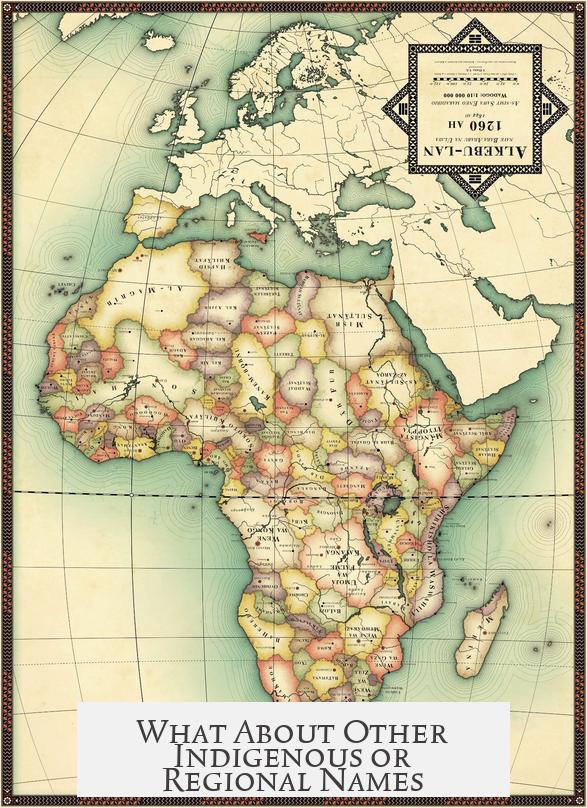
Of course, African regions and tribes had their own names and identities. For instance:
- Kabylie or Kabylia refers to a Berber-speaking region in northern Algeria. The Arabic name al-Qaba’il translates to “the tribes,” showing local identification by tribal affiliations;
- Banu Ifran was a prominent Berber tribe historically connected to the word Ifri, thereby linking to “cave dwellers;”
- Historical records, including those by Herodotus, mention troglodytes (cave dwellers) across North Africa, indicating the importance of natural geography in naming.
Names like these are regional and tribal. They represent the rich patchwork of localized identities, not a single unifying label for the entire continent.
Why Does the Idea of a Single Continental Name Not Make Sense?
Africa is vast. Encompassing around 30 million square kilometers, it’s home to over 1.3 billion people, speaking thousands of languages.
This diversity negates the likelihood of a single original name across epochs for the entire land.
Even today, different nations, ethnic groups, and languages use different words to refer to Africa and its parts. Before the modern concept of continents existed, people identified with local territories.
So, expecting an indigenous, continent-wide original name is anachronistic and misaligned with historical realities.
Addressing the Other Name-Myths: Louis Africanus?
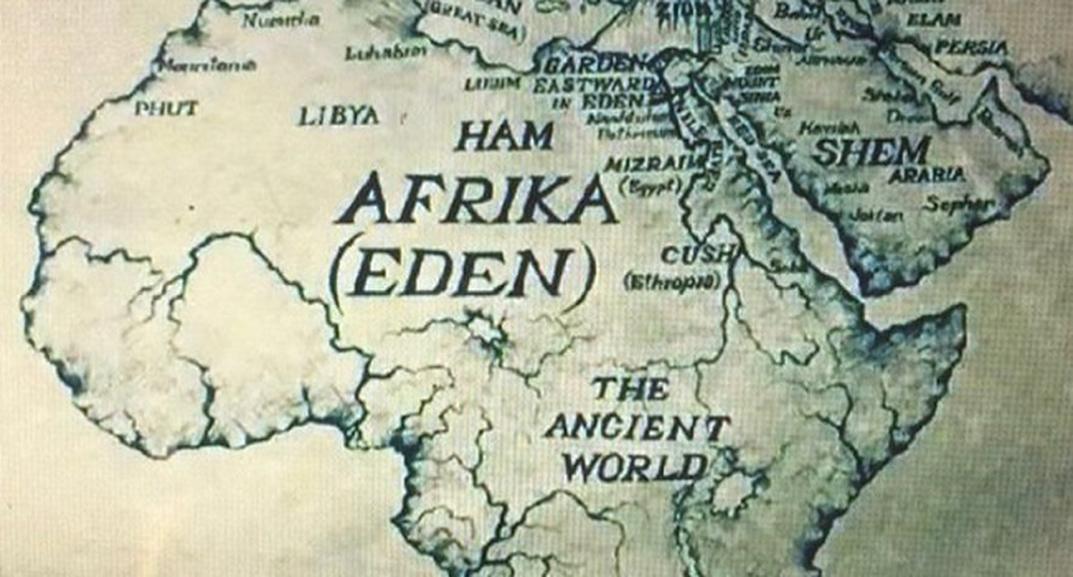
A curious myth says that Africa was named after “Louis Africanus,” a European invader who renamed the continent. Spoiler alert: no such thing happened.
The name Louis is Germanic and appeared centuries after the Roman period. “Africanus” was a Roman cognomen earned by generals after victories in Africa, never a personal surname denoting ownership over the continent.
That said, rather than being named by invaders, the continent’s name developed gradually, influenced by Roman provincial systems, indigenous tribes, and later cultural transforms through Arabic and European contacts.
Why Does This Matter? Discovering Your Own Truth
Why care about the name “Alkebulan” or the etymology of “Africa”? Because names hold stories, power, and identity. Reclaiming lost tales or misconceptions can inspire pride. At the same time, knowing the accurate history helps avoid falling into traps of misinformation or oversimplification.
Could a new name unify a continent with so much linguistic and cultural variety? Almost certainly not. But understanding and respecting the myriad local names—Kabylie, Ifriqiya, Banu Ifran—and their meanings enriches our view of Africa’s past.
Here’s a practical tip: explore your local heritage and language names. This creates a tangible link to your roots beyond pan-continental labels.
In Conclusion: The Verdict on Alkebulan
“Alkebulan” is more of a modern construct or a symbolic name embraced by some groups for cultural or political reasons, rather than a historically attested indigenous name for Africa.
Evidence points to the name “Africa” emerging from Roman times, linked to native tribes and regions around Carthage. The continent’s deep and diverse history simply does not support the existence of one genuine ancient pan-African name.
Instead of searching for a mythical single name, appreciating Africa’s multitude of histories, languages, and cultures delivers a far richer and real identity.
“Africa has a 250,000 year history of human life and thousands of languages across six language families. To claim a single toponym for the whole is absurd.”
So the next time someone asks you if “Alkebulan” was Africa’s first name, you’ll have a well-informed answer—and maybe even a little smile at the curiosity behind this modern legend.
